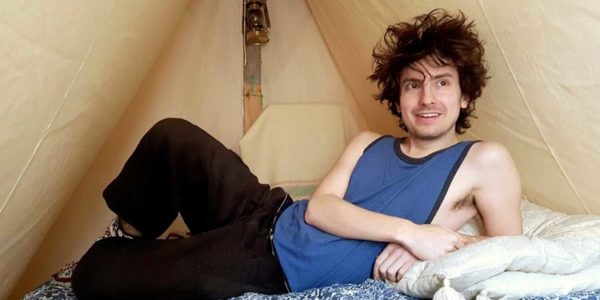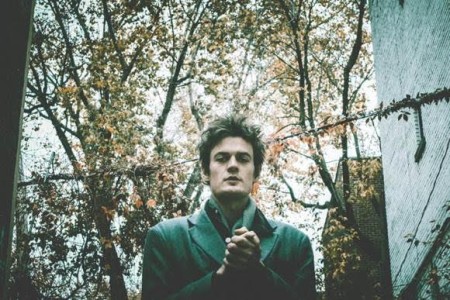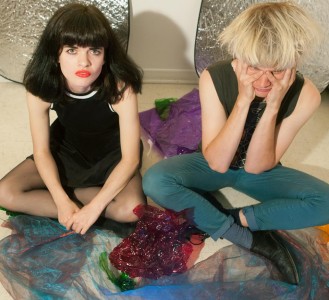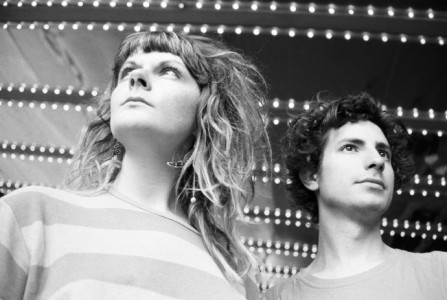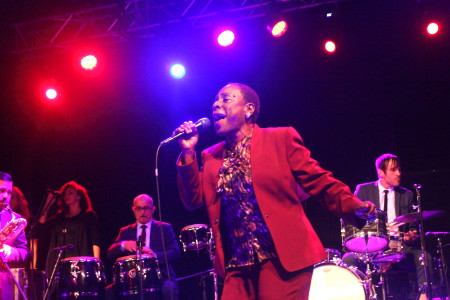Interview with Moon King’s Daniel Benjamin

Moon King is the combination of two long-time friends and musical collaborators from Toronto – Daniel Benjamin and Maddy Wilde. They started out by releasing 2 EPs, Obsession 1 and Obsession 2, and are now about to unveil their first full-length album, Secret Life, on Last Gang Records. It’s dreamy and intense, the vocals reaching out over music that shows traces of influences from artists as diverse as Kraftwerk and Neil Young. Dark, epic, and intriguing, Moon King have just been on tour with Alvvays, honing their talents on the road. They’ve released a couple of teasers from the album, as well as an intriguing live video that mixes the two songs together, and Northern Transmissions wanted the backstory. Alice Severin spoke with Daniel Benjamin as he prepared for their next tour about singing, the desert, and inspiration.
Northern Transmissions: How are you and where are you right now?
Daniel Benjamin: I’m just in Toronto right now, and I’m about to head to Montreal. Yeah, just sort of start getting things ready for the tour and everything.
NT: And you’ve just been touring in the UK with Alvvays.
DB: Yeah. I think it was over a month, I think, that I was there. And then I went to London on my own afterwards for a little while, which was pretty cool. I never really got a chance to spend much time there myself, so that was very nice.
NT: How did you like it? Where did you go?
DB: I just sort of walked, like I walked everywhere. Like the tube is so expensive, I just want to take my time. I would walk for like eight hours, you know. Mostly, I think I was there to work on music. (laughing) I needed to take a break because I don’t know many people there, so I wanted to take a break from hanging out with anyone, and sort of hide for a while. I like to do that with different cities too.
NT: That sounds good. London is a great place to do that.
DB: Yeah, you can meet a lot of interesting people. Even just walking around, I got inspired. I mean, obviously it’s got a lot of music. I mean, the music history there… (laughs)…it’s sort of the one, right? Music city.
NT: Will you go back there on this tour you’re starting now? Where will you be heading?
DB: Yeah, it goes to the UK eventually. It’s sort of everywhere, it’s in Canada, then around the United States, and then over to Europe and the UK again. I thought when we did the Alvvays tour, I sort of had my fingers crossed that it would be what I wanted it to be and that people would start responding to what we were doing, in a certain way that I hoped they would. And they did. And the key is I think our music actually fits in a lot more in the UK than it does over here. And maybe it’s more of a general cultural thing, that people in the UK just really, really love music. But I think there’s something about what we do that really connects over there. And by the end of it I thought, we have to come back, as soon as we can. And so we hastily put together this other tour. Luckily there are some other bands touring over there, like Unknown Mortal Orchestra, who are also friends of ours. That was kind of an easy match, so we’re going to do some shows with them over there.
NT: How did you and Maddy Wilde start working together?
DB: We’ve known each other since we were really young, like we grew up just about a block away from each other in the Annex in Toronto. We’re Toronto kids, we grew up here and I think our roots are here. We played together in different projects and things. I think when we got to a certain age, we sort of realized, like hey, I think we really want to do this. Music is something that if you take yourself too seriously you’re going to fall on your face and embarrass yourself. But if you take it just the right amount of serious, you’re going to fall on your face and then everyone will love you for it. (laughs) So I think maybe that’s the best way to approach it. You know, still have fun, but – I really want to do this. (laughs) I’ve never thought of it as sort of a hobby or anything.
NT: In some ways, this album feels slightly different from the EPs. Do you think something has changed about your approach?
DB: I mean, the way that I write is still the same. But, I think the songs we chose for this album…I mean, there are only 9 songs on the album, it’s still pretty short, and we had a lot more going. But I had this feeling that I needed to make something that was like how I was feeling at the time, which was not good. I feel like it’s a bit of bummer kind of album. Everybody who listens to it tells me that they think it’s really uplifting. (laughing) I don’t know how to feel about that. But there is a definitely a conscious decision to put all the songs on the record that had a consistent feeling, which is generally – I think it’s pretty dark. The music is not difficult, but you can tell there’s a lot of conflict in it. And the lyrics especially. We have the lyrics all printed in the album sleeve, and people who have read them are sort of surprised. They’re like, oh. (laughing) I didn’t realize things were so bad for you.
NT: It’s great that you’re putting in lyrics. That’s one of the things that was lost with downloads, where you could actually hold something and sing along, or read along, really absorb what was being said.
DB: Definitely, yeah. For me, that’s the most important part of writing, is the lyrics. The song writing part, the melodies and the chords, and things like that, those always come kind of really easy. Most of the songs are all written really fast, and the lyrics are worked on for a while to make sure that everything you’re saying is like the right thing to say.
NT: Do you write the lyrics after you’ve written the music, or do you keep ideas and phrases around that you want to use?
DB: Well, sort of both. I always fit them in after. But sometimes I’ll think of something, and write it down and save it and then I’ll insert it into a song later. But the best way to write, for sure, is to do the lyrics immediately afterwards. And then even if you take time finishing it, getting the whole idea out as fast as you can is really important. I think definitely all the songs that I’ve written that I’m actually happy with, all are like the fastest ones.
NT: That idea of capturing a moment.
DB: Yeah. I mean, I have a pretty short attention span, so like to go back to where you were, just emotionally, I feel like that’s pretty difficult to really feel the same way, and write it down again.
NT: People seem to mentioning a Germanic, electronic influence to your music, which is certainly there somewhat. But it seems like there is a bit of a punk attitude as well, especially live.
DB: Yeah. To me, those two go hand in hand. I mean, what is more punk than people in a concrete bunker in Berlin making techno or something. And I think there’s definitely like a 70s Noi! kind of vibe to a couple of the songs, like Krautrock kind of stuff. But at the same time, as much as I do really like a lot of that music, I feel like the idea is definitely to make pop songs. At least sort of stretched out versions of pop songs. And if I wanted to make like a really, truly boundary pushing and experimental project, which those bands were, I certainly wouldn’t be doing these interviews. (laughs)
NT: That’s a good point. It’s a totally different thing. What else influences you?
DB: Yeah, there’s influences from Krautrock, and there’s a lot of influences on the record from more purist electronic music, stuff like Kraftwerk. I always liked this composer, Harold Budd, he was one of my favorites. This kind of minimalist piano and synthesizer music. Or also like a lot of orchestra stuff. That’s never something that I’ve been trying to do, in that genre, but the sound though, I like to take the sound and just use that as the context. It’s kind of like painting or something – you just choose your colors or whatever and then you put it on to your own thing. My thing just happens to be sitting down and writing a song. But then I like the color of all these various different eras of electronic music, and things like that.
NT: That’s an interesting metaphor, that you’re picking and choosing and putting together a painting of different ideas.
DB: And mixing in guitars too. I feel like the guitars do something. There’s an established way of writing songs with guitar, and I don’t really know how to play guitar, so I can’t really do that. So I have to just use that in the same way that I use a sampler or a synthesizer, or anything. It’s just another color, I think.
NT: That way you’re approaching things in a fresh way.
DB: I heard somebody say the other week, you should always try to write on an instrument that you can’t play. Like if you’re a really good piano player, write on guitar. If you’re a really good guitar player, write on piano. I guess just because of the good ideas that will come out. I’m not a good player of anything, so I can write on whatever instrument I want. (laughs)
NT: Is this album self-produced as well?
DB: Yeah. That’s one thing I actually feel pretty good about, and eventually I’d like to get more into doing that with other artists. Because I feel as a producer, there’s a lot I can do. Maybe because I understand how the studio works and I like that environment a lot. But yeah, all the stuff I produce.
NT: Are there certain types of sonic ideas that you focus on when you’re working with the songs?
DB: Usually I try to make everything really direct. So, like especially with guitars, I never use any amplifiers or any microphones, always just plug them right into the mixing board. And I think, like a lot of people were forgetting about lyrics and things like that, in this record I wanted to not use any reverb or mask the vocals a lot. And I mean, I don’t sing really clearly – that’s just the way that I sing. But I wanted to try and expose it a little bit more. Make it almost like a little bit uncomfortably close, so that people can hopefully understand it. And if they can’t, then that’s ok, the lyrics are in there.
NT: You’ve got a unique voice and there is a kind of raw quality on the songs that you’re singing on. Do you think about having a certain style when you sing?
DB: I’m pretty new at singing at all. The songs that I was singing on the EP, those are pretty much the first songs that I started singing on. And really I write for Maddy’s voice half the time anyway. And she’s a really good singer, she actually knows how to sing. So I think it’s interesting that we grew up together and we have very similar voices. There’s one of the main things about the band, that people always tell me that they thought that this song was Maddy singing, or that this song was me, and half of the people who hear the record can’t tell. Which is really kind of a compliment because she’s a really good singer, and I’m a really bad singer. (laughs) It’s nice that people say that. You know, there’s a couple of songs on the record, like the song “Apocalypse” where it got posted on line and people were saying, oh, the singer Maddy Wilde’s voice duhduhduhduh…and it just makes me laugh, because I’m kind of like, they don’t even know, they’d be so surprised if they saw us play.
NT: But that’s a good thing, that surprise. And your voices do really have similar tones.
DB: Yeah, totally. There’s a few songs where I honestly can’t remember which of us is doing it because we’re just sort of blended together. I mean, I sing androgynous a bit. All of my favorite singers are all women, so I feel like that’s a bigger influence on me.
NT: Who are your favorites?
DB: Not that I’ve ever tried to imitate her voice, or anything, but obviously like Bjork is the biggest influence, early on, like when I was in high school, discovering her. I think Neko Case is one of my favorite singers, I love her voice. And I hear newer artists as well, and I love their singing. Like I just heard Angel Olsen for the first time a few months ago, and I love her voice. Who else? Julee Cruise, as well. I like her voice. There’s a few. (laughs)
NT: In the song “Apocalypse”, the way it suddenly springs into life and builds in intensity – that gives it so much power. Did you know from the start that you wanted the song to have that kind of dynamics, or was that something you were experimenting with?
DB: Yeah. You know, you can only really pull that off once in a show. And we usually start the show with that song. So, when everything comes in like that, it’s like that’s the moment where we know if the show is going to work or not. Because it’s sort of like you have one chance. There’s two minutes of anticipation, right? And then at that point everything just sort of explodes. And you can tell whether people are feeling it or not. But I don’t think originally we had it so extreme. I think originally it was a bit more drone-y and…most of the song is just one chord. I think the original version of that I just did on my own, like in a bathroom somewhere and I just made a video of it and it was just me. And I improvised this really long thing, it was probably like 12 minutes long, and all the melodies, and a couple of the little changes in there and some of the lyrics too, were just all in this one long improvised thing. And I just chopped it up, and rearranged it, and then we learned it as a song. So that’s why that song is such an odd structure, because it’s actually just an improvisation that we learned.
NT: It’s very intense, yet it seems constructed, so that’s interesting that it comes from an improvisation.
DB: I think we played about 100 shows before recording the album. And pretty much all of the shows, we played that first. (laughing) So we had a lot of practice to get it right before we went in to actually record it.
NT: When you record, do you try and get it live?
DB: That’s the biggest difference, actually, with this record. This one we actually did all live together with the backing band as well. So it was actually five people playing all together for the whole record. And then the EPs are just me, basically. And Maddy would come in and sing. But I think it sounds like the same band. There’s just a lot more detail on it.
NT: This album maybe sounds a bit richer, more complete.
DB: Yeah. I think part of it is just from playing that many shows. Like we really figured out what the band sounds like, instead of…I mean this is something that happens to every band, especially now. It’s like now the guy makes his bedroom demos and then he makes a live band, and then the live band goes on tour, and then they make an album. (laughs) People have proven that’s the way things go now.
NT: Some people don’t like playing live. But you enjoy it?
DB: I love it, yeah. That’s been the main focus for me. I like to go on tour, and I like to have all those experiences, meet all these people, things like that. I mean, I understand why some people don’t like it, but that’s never been my attitude. I can’t see a point where I’m ever going to feel like I don’t want to play music on stage anymore, just record or something like that. That seems kind of ridiculous.
NT: Seeing the audiences, and seeing how they respond to a song, that must give you, aside from a good feeling, a sense of how it’s working.
DB: Yeah, yeah, that’s everything for me. That’s the whole reason to do it, to get that immediate response from people.
NT: You’ve chosen interesting titles. “Roswell.” Is there a story behind that one?
DB: Yeah, that one I wrote around the same time as “Apocalypse” and they’re sort of the same song – like they have the same chords. And we play them sometimes together – and we just made a live video where we play them together. But the title is just because I was with my brother, we were driving on tour near Roswell, in New Mexico. And we were driving, and I think we stopped, just on the freeway, in the middle of nowhere, like really in the middle of nowhere, on that long highway that goes between Roswell and maybe, Amarillo, Texas? There’s really nothing there. And we’d been driving all night, and we stopped around the time the sun was coming up. And my brother slept in the car a bit, and I went outside and walked around, then sat down and wrote the song, or whatever. And then we ended up in Roswell later that day, so I decided to call it “Roswell.” That’s really about it. (laughs) It’s not about aliens, or anything like that.
NT: Being out there where it’s so empty, and with all that history, did it feel strange?
DB: It feels very science fiction being out there. And we went to the UFO museum actually that day, which was really, really weird. But the song itself doesn’t have any extraterrestrial theme, or anything.
NT: But that’s a great image – dawn in the desert, in the middle of nowhere.
DB: Yeah, it was pretty surreal. You can sort of see why people feel like those areas, like the desert really, gives people the feeling that they’re on another planet. It just looks so alien.
NT: A place to go on a personal quest.
DB: Yeah, yeah, do some peyote and walk around. (laughs)
NT: And five albums that inspire you.
DB: Let me think. Ok. Well my favorite record is probably that Bjork album, Vespertine. That was when I sort of discovered her. I think this record by our friend’s band Twin Sister called Mr. Twin Sister, they put it out last year. I think it’s one of the best records I’ve heard. I think maybe, The Clash, I’ve been listening to them a lot, a record called Sandinista! It’s long, it’s like 20 songs or something. I think the new Kendrick Lamar album is also the best thing I’ve ever heard. It just came out, like last week. To Pimp a Butterfly. Like I really think that it’s important, and it’s amazing that it’s receiving this kind of recognition. I think it’s the number one album in the US right now. For a record that’s that far out and crazy, I think that’s amazing. I’m trying to think of another classic. Maybe like a Neil Young album. Neil Young, after Bjork, is probably my favorite artist. Maybe…After the Gold Rush. That’s probably the best one, right? He’s got so many good albums, I don’t know which one’s the best. Actually Neil Young is probably one of the singers I feel influenced by, the way that he sings, it’s really high, and kind of untrained, but it’s good. You can feel it when he’s singing, that’s very important.
Alice Severin
Latest Reviews
Tracks
Advertisement
Looking for something new to listen to?
Sign up to our all-new newsletter for top-notch reviews, news, videos and playlists.





